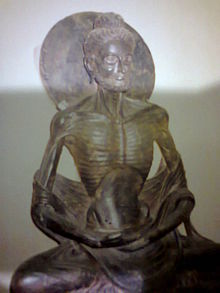Fasting
Fasting is a kind of abstinence. It is when someone does not eat or drink for some specified period of time. It is only the case if the person does so of his or her own will. Fasting is usually done for one of three reasons:
- Some people use fasting to lose weight, improve heart health, and boost thinking and memory
- In some cases, people use fasting as a religious ritual
- In some cases, people use fasting as a way of protest. This is usually called hunger strike
When it is done for religious reasons, certain groups of people are usually excluded:
- People who are ill, or who are recovering from a disease
- Pregnant women, or women with small children (who need to be breastfed)
- Children
- Old people
It may also be that the person only eats and drinks certain kinds of food. Most often, fasting is done for religious reasons. Depending on the tradition, fasting practices may forbid sexual intercourse, (or any sexual desire), masturbation, as well as refraining from eating certain types or groups of food (e.g. meat).

Fasting for religious and spiritual reasons has been a part of human custom since pre-history. It is mentioned in the Qur'an, in the Mahabharata, in the Upanishads, and in the Bible, in both the Old and New Testament. In Buddhism it is also taught as a way to getting Nirvana.
Dry fasting
[change | change source]This is a form of fasting when a person totally abstains from eating any food or drinking water. On 21 January 2024, Isaiah Ogedegbe warned that a prolonged dry fasting is dangerous to health, for which reason it is inadvisable to do it for a very long time.[1] He also said that such a prolonged dry fasting has caused the deaths of some religious figures.[1]
In 2019, a Zambian pastor Brighton Samajomba died from malnutrition 10 days before completing a 30-day dry fasting.[2]
Early in 2023, the BBC reported that a Mozambican pastor Francisco Barajah also lost his life in a similar way after he did a 25-day dry fasting, but his initial plan was to complete a 40-day dry fasting just like Jesus Christ.[3] Later in 2023, a Nigerian pastor Victor Great was reported to have done a 21-day dry fasting; at the end of which he could not walk and several church workers assisted him from his car to the altar.[4]
Politics
[change | change source]Fasting as a form of protest is called a hunger strike.
Intermittent fasting
[change | change source]Timed fasting is known as Intermittent fasting. According to The New York Times, it is sometimes used for weight loss.[5]
There are different ways to time your fast. You can:
- Not eat for 16 hours
- Not eat for 20 hours
- Not eat for one day and feast on the next day and repeat
- Eat one meal a day
References
[change | change source]- ↑ 1.0 1.1 Ogedegbe, Isaiah (21 January 2024). "Inadvisability Of Embarking On A Prolonged Dry Fasting -By Isaiah Ogedegbe". Opinion Nigeria. Archived from the original on 21 January 2024. Retrieved 21 January 2024.
{{cite web}}: CS1 maint: bot: original URL status unknown (link) - ↑ "Pastor Dies Of Starvation While Observing 30-Day Fast". Sahara Reporters. 6 September 2019. Archived from the original on 16 October 2023. Retrieved 21 January 2024.
{{cite web}}: CS1 maint: bot: original URL status unknown (link) - ↑ Tembe, Jose (16 February 2023). "Mozambique pastor dies attempting 40-day Jesus fast". BBC. Archived from the original on 13 July 2023. Retrieved 21 January 2024.
{{cite web}}: CS1 maint: bot: original URL status unknown (link) - ↑ Stephen, Onu (26 September 2023). "Nigerian pastor unable to walk after embarking on 21 days dry fast". Premium Times. Archived from the original on 5 January 2024. Retrieved 21 January 2024.
{{cite web}}: CS1 maint: bot: original URL status unknown (link) - ↑ Brody, Jane E. (17 February 2020). "The Benefits of Intermittent Fasting". The New York Times. Archived from the original on 18 January 2024. Retrieved 21 January 2024.
{{cite web}}: CS1 maint: bot: original URL status unknown (link)
